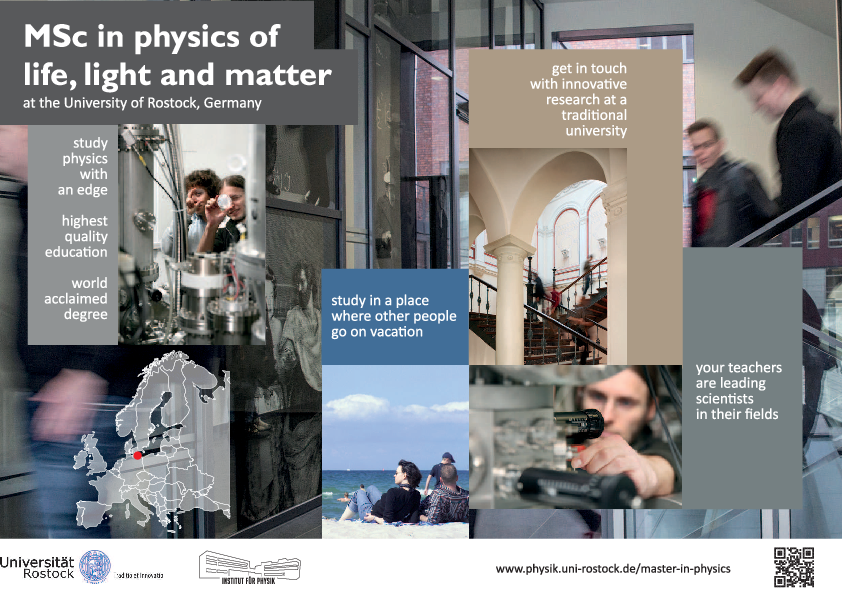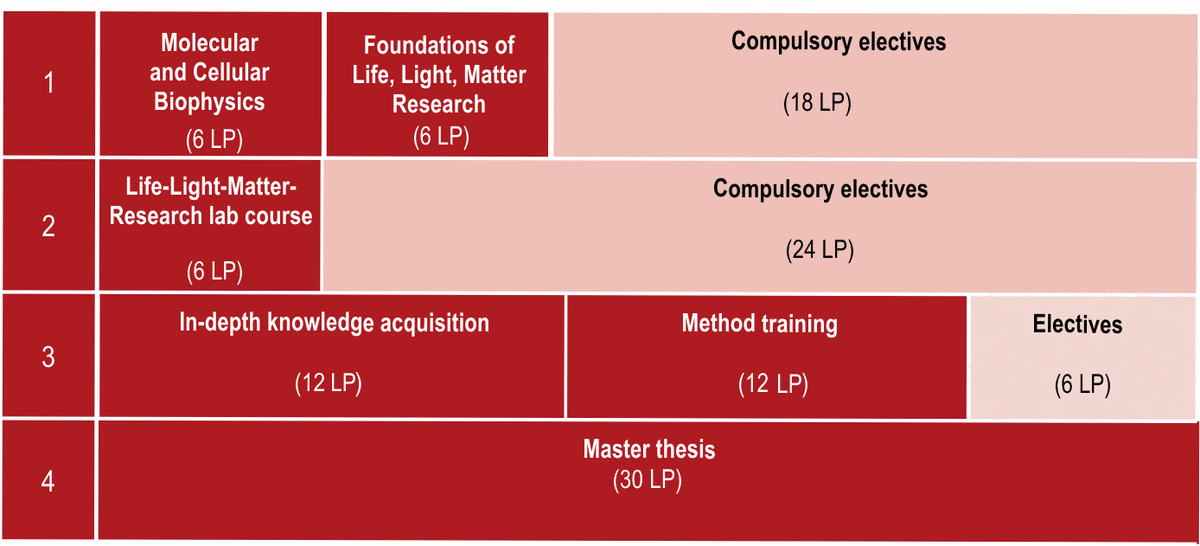This programme has been terminated
The website may contain outdated information
Not outdated at all: The general programme MSc in Physics can be studied in English and is open for international students.
International MSc in Physics of Life, Light and Matter
This programme has been terminated.

Beginning with winter term 2015/16, the focus of our international master program will be pointed at the physics of life, light, and matter. It is taught solely in English. Rostock University has a policy of constantly enhancing its international diversity.
Prospective master students are expected to come from
- Germany
- Europe
- non-european countries.
The research-oriented study requires a Bachelor degree in physics, for further requirements, see Admission. Besides the formal requirements we invite you to take our self assessment test in order to get an idea about the background we expect you to have.
The program focusses on the physics at the interface between life sciences, natural sciences, and engineering. The students are enabled to do research in areas which aim to control material and system properties on a microscopic or molecular level. Examples are the functionalization of biological, chemical or physical systems, and the control of light-matter interactions.
Why would you want to join Rostock University?
Rostock University, being one of the oldest universities in Northern Europe, is rich in tradition but also proudly innovative in many ways. After German unification, the newly-won freedom was used to implement a major organizational overhaul and a full relaunch of structures, staff, and all research and teaching programs. This major improvement now bears fruit, as is reflected in all recent evaluations.
Consider Physics: In a recent independent evaluation this institute has been ranked in the top group in teaching quality among all German physics departments. At the same time the Institute of Physics receives high marks for its top notch research.
Contact Person
Prof. Dr. Boris Hage
room 217
phone +49 381 498 6770
msc.physicsuni-rostockde
Language: English throughout. Should you enjoy to learn the German language, you also have the possibility to attend courses in German, but there is no obligation.
Duration: 4 semesters = 2 years. Program starts annually in October. (Please submit your application by August 1).
Structure: The study program consists of compulsory, compulsory elective, and elective modules.
In the first two semesters, the students get acquainted with advanced scientific concepts and methods of physics. Compulsory modules are Molecular and Cellular Biophysics, Foundations of LLM Research, and Life-Light-Matter-Research lab course. Among the compulsory elective modules one should study at least three of the following modules: Atoms and Clusters, Fundamentals of Photonics, Molecular physics, Nonlinear Optics and Spectroscopy, Simulations Methods of Molecular Biophysics, and Surface Science and Nanostructures. Beside these modules there is an array of complementary modules: Analysis of structure and dynamics of nanostructured materials, Computational many-particle physics, Fundamentals of quantum optics, Nanotechnology in materials´ synthesis, Physics and technology of optical fibers, Quantum optics of macroscopic systems, and Semiconductor optics.
Electives can be chosen from the courses offered at our Sciences and Engineerings faculties, and beyond.
During the third semester, the students acquire in the modules In-depth knowledge acquisition and Method training special knowledge and get acquainted with modern experimental and theoretical methods, respectively, in order to be prepared to perform their own research project.
The master thesis with a scientific topic of current interest is completed in the fourth semester under guidance of experienced scientists of the Institut of Physics or from scientific groups belonging to the Department „Science and Technology of Life, Light, and Matter“ of the university‘s Interdisciplinary Faculty.
Degree: The successful student is awarded the degree of a Master of Science. Enjoy the benefit of quality teaching and a reputed degree "Made in Germany".
Is there more beyond? Absolutely. More than half of our international program's graduates have stayed on to pursue a doctoral degree. There are no academic or administrative obstacles hindering the transition.
Cost: There is no tuition fee. It is a tradition in Germany that education is considered a common good that should be accessible to all. The German taxpayer subsidizes the cost of universities.
Fringe Benefits:Germany is one of the major economies of the world. Over centuries it has acquired a reputation in science and humanities, as well as in culture and the arts. To be immersed in this country will be a unique experience. You will likely pick up some of the language (you may also want to get serious about that; we offer language classes). This will enable you to grasp German culture in its various facets, and also obtain an impression how the national psyche copes with the darkest spots in our history.
Rostock (population 200 000) is located ca. 200 km each from two of the largest German cities, Berlin (the capital) and Hamburg. Rostock is on the shores of the Baltic Sea; the area is one of the most popular vacation destinations in Germany. There is ample opportunity to enjoy wonderful beaches and more – even the most diligent student appreciates that!
Requirements: Entry qualification
- Bachelor of Science degree in physics or equivalent degree
- Access to the Master's Program Physics of Life Light and Matter at the University of Rostock is connected to the following additional entry requirements:
- Applicants have accquired at least 40 credits in Experimental Physics, 25 credits in the field of Theoretical Physics and 25 credits in mathematics. Applicants may catch up 12 credits within the first year.
- A final note referred to university degree, which corresponds to 75 % of CGPA (Cumulative Grade Point Average) or an equivalent note.
- A good working knowledge of English at the minimum level B 2 (Common European Framework of Reference for Languages) or equivalent (e.g., TOEFL IBT: 72-94, for other certificates see here). Native speakers are exempt from a proof of language proficiency.
- The admission requirements according to section 2 have to be proven with certified copies of the related certificates enclosed to the application for admission to study in this study course.
- In individual cases, applicants who do not meet the criteria listed under section 2 can be accepted in case they are expected to be particularly qualified for the master study course. Related matriculation applications have an enclosure (one page) that describes why the candidate has chosen this study course and considers him/herself to be qualified for it. These applications are presented to the examination board for decision.
Besides the formal requirements we invite you to take our self assessment test in order to get an idea about the background we expect you to have. This test does not have any consequences regarding your admission.

